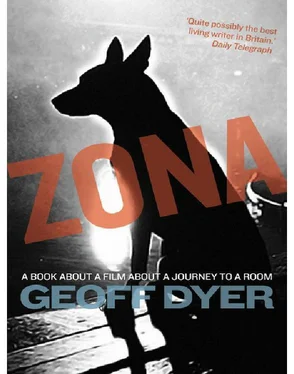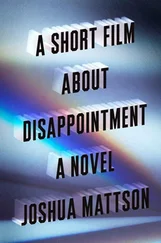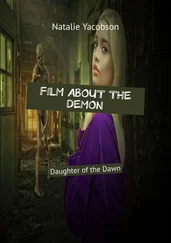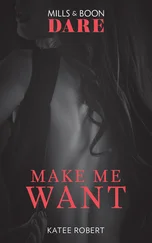Every time I see people drinking in films I am immediately seized with a desire to have a drink myself. Certain countries — that is, the films produced by certain countries — tend to make particular drinks look especially alluring. French films, predictably, make one crave red wine, but whites with a château on the label look pretty good too. Whiskey looks good in westerns. (‘Men swaggering into saloons. Thirsty from cattle drives.’) Beer looks good anywhere. And not just in films. In most countries of the world, even the shittiest ones, you can generally get your hands on a beer that is, as they say, drinkable. Speaking of beer, we are interested, obviously, to see if Stalker is going to get one down him. Who knows, perhaps he’ll even get his round in? As it turns out, only Writer drinks anything at all. Professor sits with his coffee and Stalker just looks anxious. Writer is the one doing the drinking — maybe he should have been called Drinker — and he is also the one doing most of the talking. When Professor asks him what he writes he says one should write about ‘absolutely nothing.’ So, a Flaubertian in his way. In a letter of 1852 Flaubert announced his desire to write ‘a book about nothing, a book dependent on nothing external, which would be held together by the internal strength of its style, just as the earth, suspended in the void, depends on nothing external for its support; a book which would have almost no subject, or at least in which the subject would be almost invisible, if such a thing is possible.’ In this direction, Flaubert believed, lay ‘the future of Art’: ‘There is no longer any orthodoxy, and form is as free as the will of its creator.’ Compared to content-driven Hollywood cinema this sounds like a reasonable prediction of what Tarkovsky would achieve in Mirror (the film he made before Stalker): not a film about nothing, obviously (it could equally claim to be a film about everything), but one held uniquely together by the director’s style—‘the will of its creator’—rather than by the mechanical demands of narrative or ‘the burden of tradition.’ Flaubert concludes this interlude of speculation with an observation that could have come straight from Tarkovsky’s diaries: ‘From the standpoint of pure Art one might establish the axiom that there is no such thing as subject — style in itself being an absolute manner of seeing things.’
Anyway, they’re standing round the table in the bar, having a good old chat and a drink, though really Writer is the one doing most of the chatting and all of the drinking — and, in the time-honoured tradition of the drunkard, he’s repeating himself. He’s going on about triangles again, just as he was with the woman outside, before Stalker sent her packing. Triangles this, triangles that. He wonders why Professor is going to the Zone but then launches into his own explanation of why he’s going there, what he’s looking for. Inspiration, it turns out. He’s washed up. Finished. Maybe by going to the Zone he’ll be rejuvenated. Man, I know how he feels. I could do with a piece of that action myself. I mean, do you think I would be spending my time summarizing the action of a film almost devoid of action — not frame by frame, perhaps, but certainly take by take — if I was capable of writing anything else? In my way I am going to the Room — following these three to the Room — to save myself. 10
All the time this conversation is going on, the camera is moving in, getting tighter, but so imperceptibly you can’t tell it’s happening until it’s happened, until we are practically leaning on the table with them. Often, in Tarkovsky, when we think something is still it’s not; at the very least, the frame is contracting or expanding slightly, almost as if the film were breathing.
We hear the hooting of a train, can hear that lonesome whistle blow. So, this grim-looking bar does have several things going for it — if by ‘several’ we mean ‘one’, namely proximity to the railway station. The hooting grows louder. Do you hear it? Our train? says Stalker, checking his — i.e., his wife’s — watch. 11They get ready to leave the bar. No one says, ‘Drink up!’ but that’s pretty much the idea. The camera continues to move in on Stalker, who says to Luger, the lugubrious barman — a type so strong and silent he could have found work as an actor back in the 1920s, before the introduction of sound — that if he doesn’t make it back, to ‘call’ on his wife. And what? Deliver a message of condolence? Sit there smoking a cigarette, silently? See if there’s any chance of her laundering his jacket? After this speech Stalker stares right at the camera. Writer is about to leave the bar, we see the back of his head and then he turns and stares straight at the camera so that, momentarily, in accord with the shot-reverse-shot convention, Stalker and Writer have both stared straight at each other. But it also seems that they are staring straight at us. This is in direct contravention of Roland Barthes’s edict in his essay ‘Right in the Eyes’, that, while it is permissible for the subject to stare into the lens — at the spectator — in a still photograph, ‘it is forbidden for an actor to look at the camera’ in a movie. So convinced was Barthes of his own rule that he was ‘not far from considering this ban as the cinema’s distinctive feature…If a single gaze from the screen came to rest on me, the whole film would be lost.’ In this case, the effect is to implicate us in the reciprocity of their gaze. We are going along for the ride too. We are one of them.
THEY — WE — HEAD OUTSIDE. Stalker is carrying some kind of carry-out and he tramps through a puddle. This is no accident. Whatever else he may be, Stalker is a man with a MacArthur-like indifference to getting his feet wet. They clamber into a waiting jeep. The air is filled, now, with the constant blowing of the lonesome whistle. It is raining and the headlights of the jeep are pure white in the gloom and damp. Stalker is driving. Although we cannot see the rain falling through the air — it is drizzling, not pouring — we can see puddles, rain sprinkling the puddles and the headlights reflected in the puddles, and the jeep driving through the drizzled headlights of the puddles, driving through shrubbery, through damp and gloomy alleyways in which lingering mist still lingers. The jeep is perfectly chosen. No other vehicle could serve as well at this juncture. A Mini Cooper would have established a connection with The Italian Job (as Nostalghia should perhaps have been called) and the sleek convertible we saw at the beginning would have lent a touch of class and glamour, but the jeep, for all its discomfort, harks back to the Long Range Desert Group, to every movie ever made about the Second World War. It is the most swaggering of vehicles, designed for gung-ho generals (Patton) and fearless war photographers (Capa) and, as such, is immune to traffic regulations and the slow congestion of supply convoys. It is synonymous with pure, rugged and manly adventure. They are overcoated commandos, these three (one of them will actually turn out to be an explosives expert), volunteers on a daring raid behind enemy lines, with more than a hint of Last of the Summer Wine thrown in.
AS THE JEEP turns a corner they hear the sound of a revving motorbike and hit the deck, the damp deck. On release Stalker was billed as a sort of sci-fi film and this is the beginning of the most sci-fi-y sequence in the movie, even if, overall, Tarkovsky was pleased with the way that he’d been able to get rid of most of the elements that made it look like sci-fi, in a way that he had not been able to do with Solaris, which remained within the confines of genre (difficult to avoid with a movie set in the future, on a space station) and was, for this reason, Tarkovsky’s least favourite among his films. 12
Читать дальше












